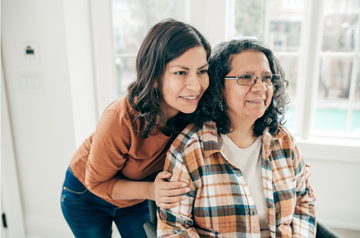
Caregiving is a noble and demanding role. You dedicate your time, energy, and emotions to supporting the well-being of others. It's a responsibility you take seriously, and one that brings immense rewards.
However, amidst the selfless acts of care, it's crucial to remember that your own health – both mental and physical – matters immensely. Just like a first responder needs to take care of themselves to be effective in helping others, you too need to prioritize your well-being to ensure you can continue providing quality care and emotional support to your loved one. After all, you can't pour from an empty cup.
The Importance of Self-Care
Caregiver burnout is a serious condition that can lead to a cascade of negative consequences for both the caregiver and the care recipient. When caregivers are stretched too thin and neglect their own needs, they become susceptible to physical health problems like headaches, stomachaches, and weakened immune systems. They may also experience emotional and mental health challenges such as anxiety, depression, and social isolation.
This can create a vicious cycle, as burnout can make it even harder for caregivers to provide the level of care their loved ones need. Ultimately, prioritizing self-care is not just about self-preservation; it's about ensuring that you can be the best possible caregiver for your loved one.

Mental Well-being:
- Emotional Check-Ins: Regularly assess your emotions. Are you feeling stressed, overwhelmed, or emotionally drained? Acknowledge these feelings and seek support if needed.
- Talk It Out: Share your experiences and feelings with a trusted friend, family member, therapist, or support group. Talking can be incredibly cathartic.
- Mindfulness and Relaxation: Practice mindfulness techniques like meditation, deep breathing, or yoga. These can reduce stress and promote a sense of calm.
- Hobbies and Interests: Make time for activities you enjoy, whether it's reading, painting, listening to music, or spending time in nature. These can recharge your mental batteries.
- Set Boundaries: Don't be afraid to say "no" when you need to. It's okay to set limits on your time and energy.
- Professional Help: If you're struggling with anxiety, depression, or other mental health challenges, don't hesitate to seek professional help. Therapy can be transformative.
Physical Well-being:
- Sleep: Prioritize quality sleep. Aim for 7-8 hours of sleep each night to allow your body to rest and repair.
- Nutrition: Eat a balanced diet with plenty of fruits, vegetables, and whole grains. Avoid excessive caffeine and processed foods.
- Exercise: Regular physical activity can boost your mood, reduce stress, and improve your overall health. Even short walks or gentle stretches can make a difference.
- Schedule Check-ups: Regular check-ups and screenings are crucial for early detection and prevention of health issues.
-
Respite Care: Explore options for respite care to give yourself a break. This could involve asking a family member or friend for help, hiring a temporary caregiver, or using adult day care services.

Additional Tips:
- Join a Caregiver Support Group: Connecting with others who understand your challenges can be invaluable.
- Learn to Delegate: Don't try to do it all yourself. Ask for help from family, friends, or community resources.
- Celebrate Small Victories: Acknowledge and celebrate your successes, no matter how small.
- Be Kind to Yourself: Accept that you're not perfect. It's okay to make mistakes and ask for help.
Remember, self-care isn't a luxury; it's a necessity. By taking care of yourself, you'll be better equipped to provide the best possible care for your loved one.
Don't Hesitate to Reach Out:
If you're struggling with caregiving responsibilities or feeling overwhelmed, remember that you're not alone. There are resources available to help you. Reach out to your doctor, a therapist, a caregiver support group, or a trusted friend or family member.



